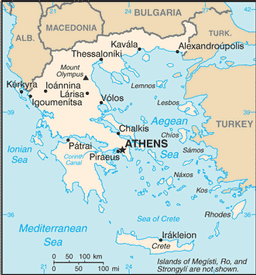Greece
 Greece is country of Europe located in south Europe.
Greece is country of Europe located in south Europe.
Details
| Official Name: | Hellenic Republic |
| Capital: | Athens |
| Total area: | 131 957 km2 |
| GDP per capita: | $24,505 |
| Native Language: | Greek |
| Government: | Unitary parliamentary constitutional republic |
| Population: | 10,815,197 |
| Major Religion: | Greek Orthodox Church Christianity |
| Monetary Unit: | Euro (EUR) |
Located near the crossroads of Europe and Asia, Greece forms the southern extremity of the Balkan peninsula in south-east Europe. Its territory includes more than 2 000 islands in the Aegean and Ionian seas, of which only around 165 are inhabited. Mount Olympus is the highest point in the country.
Greece is one of the cradles of European civilisation, whose ancient scholars made great advances in philosophy, medicine, mathematics and astronomy. Their city-states were pioneers in developing democratic forms of government. The historical and cultural heritage of Greece continues to resonate throughout the modern world - in literature, art, philosophy and politics.
Modern Greece has a republican structure based on the constitution of 1975. The 300 members of the single-chamber parliament are elected for a period of four years. The country is divided into 13 administrative regions.
More than 50% of Greek industry is located in the Greater Athens area, the main economic sectors being agriculture, tourism, construction and shipping.
The best-known contemporary Greeks include the film-maker Kostas Gavras, the Nobel Prize winner Odysseus Elitis and composer Mikis Theodorakis.
Greek cuisine is based on goat meat and mutton. Fish dishes are also popular. Olive oil, which is produced in large quantities, adds to the distinctive taste of Greek food.
Health & Welfare
National free health care service. Public insurance funds the national health care system. In some cases you might have to pay for prescription. Social insurance is comprehensive including sickness, disability, accident, old-age, and unemployment benefits, allowances for families with children, and rent aid.
Economy & Jobs
Tourism, manufacturing, construction, forestry, fishing, and mining.
Main Attractions
Athens, Crete city, Dodecanese Islands, Ionian Islands, Meteora monasteries, Northeastern Aegean Islands, and Saronic Gulf Islands.
Economy
The economy of Greece is the 34th or 42nd largest in the world at $299[99] or $304 billion by nominal gross domestic product or purchasing power parity (PPP) respectively, according to World Bank statistics for the year 2011. Additionally, Greece is the 15th largest economy in the 27-member European Union. In terms of per capita income, Greece is ranked 29th or 33rd in the world at $27,875 and $27,624 for nominal GDP and PPP respectively.
Greece is a developed country with high standards of living. Its economy mainly comprises the service sector (85.0%) and industry (12.0%), while agriculture makes up 3.0% of the national economic output. Important Greek industries include tourism (with 14.9 million international tourists in 2009, it is ranked as the 7th most visited country in the European Union and 16th in the world[103] by the United Nations World Tourism Organization) and merchant shipping (at 16.2% of the world's total capacity, the Greek merchant marine is the largest in the world), while the country is also a considerable agricultural producer (including fisheries) within the union.
With an economy larger than all the Balkan economies combined, Greece is the largest economy in the Balkans, and an important regional investor. Greece is the number-two foreign investor of capital in Albania, the number-three foreign investor in Bulgaria, at the top-three foreign investors in Romania and Serbia and the most important trading partner and largest foreign investor of the Republic of Macedonia. Greek banks open a new branch somewhere in the Balkans on an almost weekly basis. The Greek telecommunications company OTE has become a strong investor in Yugoslavia and other Balkan countries.
The Greek economy is classified as advanced and high-income. Greece was a founding member of the Organisation for Economic Co-operation and Development (OECD) and the Organization of the Black Sea Economic Cooperation (BSEC). In 1979 the accession of the country in the European Communities and the single market was signed, and the process was completed in 1982. In January 2001 Greece adopted the Euro as its currency, replacing the Greek drachma at an exchange rate of 340.75 drachma to the Euro. Greece is also a member of the International Monetary Fund and the World Trade Organization, and is ranked 31st on the KOF Globalization Index for 2010.
Immigration and residency
If you are interested in moving to the countries, either with a residence permit or by acquiring a citizenship, please contact us, and also get acquainted with the relevant migration documents.